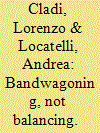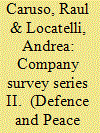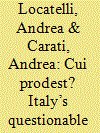|
|
|
Sort Order |
|
|
|
Items / Page
|
|
|
|
|
|
|
| Srl | Item |
| 1 |
ID:
114822


|
|
|
|
|
| Publication |
2012.
|
| Summary/Abstract |
Although realist perspectives seem challenged to explain European choices and preferences, realism retains great utility with its stress on states and states' concern for their national interests. Traditional realist analysis of European security policy err, rather, by focusing on balancing and related concepts such as soft balancing and balancing for autonomy. These accounts are theoretically and empirically flawed. Whilst balancing perspectives shed some light on European security policy predispositions, bandwagoning better explains trans-Atlantic contemporary security cooperation and increases the explanatory power of realist theories. The case for European bandwagoning is illustrated here by the empirical experience of prominent European Union military initiatives and the French defence reforms in the post-Cold War period. The tendency to bandwagon shows that European attempts to increase capabilities are strengthening rather than weakening transatlantic ties. Contrary to dominant realist views, through bandwagoning NATO benefits from European security and defence policy, becoming more durable and stronger than traditional realism expects.
|
|
|
|
|
|
|
|
|
|
|
|
|
|
|
|
| 2 |
ID:
117692


|
|
|
|
|
| Publication |
2013.
|
| Summary/Abstract |
Finmeccanica is the eighth largest arms manufacturer on a world scale. The article explains and discusses its recent evolution. In particular, we discuss the broader privatisation programme implemented by the government as a response to the 1992 financial crisis. Finally, we will present our conclusions on how the interplay of domestic factors and external pressures accounts for Finmeccanica's peculiar trends. This result, especially Finmeccanica's performance, is the consequence of a deep transformation occurred in the past 10-15?years in both the industrial base and national defence policy. The two processes appear to be somehow interrelated.
|
|
|
|
|
|
|
|
|
|
|
|
|
|
|
|
| 3 |
ID:
151525


|
|
|
|
|
| Summary/Abstract |
Since the end of the Cold War, Italy has taken part in several multilateral military operations. Many, if not all of them, have implied significant political and human costs for the country. Indeed, the very same contribution to multinational missions in terms of troops deployed bears witness of the importance the country attaches to multilateral missions. In particular, Italy displayed considerable commitment to R2P-inspired interventions. The aim of the paper is then to investigate on the deep causes that drive such an apparently value-oriented foreign policy course. In doing so, it firstly analyses the Italian contribution to multilateral missions. Secondly, the paper discusses which factors can explain such behaviour: international norms, economic and/or security interests, and followership. The paper presents a preliminary test of the drivers of the Italian engagement in multilateral military operations. In this view, it investigates empirically the public debate on Italian participation to relevant R2P-like operations like Kosovo and Libya.
|
|
|
|
|
|
|
|
|
|
|
|
|
|
|
|
| 4 |
ID:
096855


|
|
|
|
|
| Publication |
2009.
|
| Summary/Abstract |
This article suggests that the asymmetry of capabilities underlying the transatlantic partnership is NATO's main source of stability. Drawing on insights from mainstream political Realism, we stress the virtues of asymmetry (i.e. providing the allies with a wide bargaining space, increasing the cost of defiance and reducing intra-allied competition). The presence of these characteristics gives member states the incentive to prolong the convergence of their otherwise different political interests. In light of this theoretical model, we formulate some policy prescriptions. In particular, we argue that the USA and European countries should continue developing their own particular areas of expertise - i.e. implementing a functional division of labour. Therefore, contrary to widespread opinion, we conclude that the transatlantic military gap shall not be conceived as a burden, but rather as a key asset for the preservation of NATO's effectiveness.
|
|
|
|
|
|
|
|
|
|
|
|
|
|
|
|
| 5 |
ID:
191019


|
|
|
|
|
| Summary/Abstract |
Donald Trump was expected to repeal the internationalist approach that had dominated US foreign policy since the end of the Second World War, but his impact was narrower than is commonly supposed. On the one hand, the problems of the liberal international order predate Trump and probably will outlive his presidency. He was more a symptom than the cause of those difficulties, thus his responsibilities should not be overstated. On the other hand, despite several renegotiations and accusations against its partners, the US involvement in multilateral organisations remains solid and its engagement overseas remarkable. Overall, Trump’s performance in shifting US foreign policy toward an anti-globalist stance was quite poor. Contrary to mainstream accounts of Trump’s foreign policy, the president’s revisionism has arguably been thwarted less by the internationalist approach within the foreign policy establishment than by his own personality and his policy-making attitudes.
|
|
|
|
|
|
|
|
|
|
|
|
|
|
|
|
|
|
|
|
|